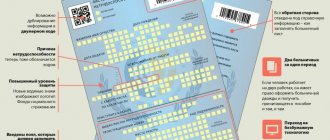Financial assistance and writ of execution
What is financial assistance for? 119-FZ “Article 69. Types of income that cannot be levied. Foreclosure cannot be applied to sums of money paid: 1) in compensation for harm caused to health, as well as in compensation for harm to persons who suffered damage as a result of the death of the breadwinner ; 2) persons who received injuries (wounds, injuries, concussions) during the performance of their official duties, and members of their families in the event of death of these persons; 3) in connection with the birth of a child; mothers of many children; single father or mother; for the maintenance of minor children during the search for their parents; pensioners and disabled people of group I to care for them; victims for additional food, sanatorium treatment, prosthetics and expenses for their care in case of harm to health; for alimony obligations; 4) for working under hazardous working conditions or in extreme situations, as well as for citizens exposed to radiation as a result of disasters or accidents at nuclear power plants, and in other cases established by the legislation of the Russian Federation; 5) by an organization in connection with the birth of a child, with the death of relatives, with the registration of marriage, as well as for severance pay paid upon dismissal of an employee.”
Summary
- Can bailiffs be withheld from financial assistance based on a writ of execution?
This is important to know: Payment period for maternity capital when purchasing an apartment
Questions
1. Can bailiffs be withheld from financial assistance based on a writ of execution?
1.1. According to enforcement documents, recovery comes from all types of income
2. Are funds from financial assistance for the treatment of a child withheld from the organization based on writs of execution?
2.1. Good day, Elena. In accordance with Article 101 of Federal Law 229 On Enforcement Proceedings, collection cannot be applied to the following types of income, clause 14 of the amount of one-time financial assistance paid from the federal budget, budgets of constituent entities of the Russian Federation and local budgets, extra-budgetary funds, from funds foreign states, Russian, foreign and interstate organizations, other sources: a) in connection with a natural disaster or other emergency circumstances; b) in connection with a terrorist act; c) in connection with the death of a family member; d) in the form of humanitarian aid; e) for providing assistance in identifying, preventing, suppressing and solving terrorist acts and other crimes;
2.2. Good afternoon. In Article 101 of the Federal Law “On Enforcement Proceedings”, such material assistance does not relate to the types of income that cannot be levied, and therefore can be withheld.
3. Are funds from financial assistance withheld from the organization based on writs of execution?
3.1. No, the aid ramps are not held.
4. Can I be deducted 50 percent of financial assistance from the organization based on a writ of execution?
4.1. No, this is illegal.
4.2. Good afternoon Galina. Article 101 of the Federal Law of the Russian Federation No. 229 On Enforcement Proceedings in paragraph 14 contains reference to the following types of financial assistance that are not subject to recovery: 14) the amount of one-time financial assistance paid from the federal budget, budgets of constituent entities of the Russian Federation and local budgets, extra-budgetary funds, for account of funds of foreign states, Russian, foreign and interstate organizations, other sources: a) in connection with a natural disaster or other emergency circumstances; b) in connection with a terrorist act; c) in connection with the death of a family member; d) in the form of humanitarian aid; e) for providing assistance in identifying, preventing, suppressing and solving terrorist acts and other crimes; Your question does not specify the reasons for financial assistance, so look at paragraph 14 for yourself. Good luck to you.
5. Are funds from financial assistance in case of illness withheld according to the writ of execution?
5.1. Hello, Angelica! Yes, these payments are withheld according to the writ of execution.
6. Is the annual financial assistance deducted in the amount of the official salary according to the writ of execution?
6.1. No, deductions from social benefits are prohibited.
7. Since 2021, my child (12 years old) and I are citizens of the Russian Federation. B/husband lives in Ukraine, deprived of his family. rights, stopped paying alimony in 2017. The Ukrainian decision is in hand. court and writ of execution. Can I receive financial assistance from the state on the territory of the Russian Federation as someone whose ex-husband does not pay child support?
7.1. Hello! Unfortunately, current legislation does not provide for such assistance.
8. Do they withhold financial assistance allocated at work due to a difficult financial situation based on a writ of execution?
8.1. Julia, good afternoon. According to Art. 101 of the Law on Enforcement Proceedings Collection cannot be applied to the following types of income: 1) sums of money paid in compensation for harm caused to health; 2) sums of money paid in compensation for damage in connection with the death of the breadwinner; 3) sums of money paid to persons who received injuries (wounds, injuries, concussions) in the performance of their official duties, and members of their families in the event of the death of these persons; 4) compensation payments from the federal budget, budgets of constituent entities of the Russian Federation and local budgets to citizens affected by radiation or man-made disasters; 5) compensation payments from the federal budget, budgets of constituent entities of the Russian Federation and local budgets to citizens in connection with caring for disabled citizens; 6) monthly cash payments and (or) annual cash payments accrued in accordance with the legislation of the Russian Federation to certain categories of citizens (compensation for travel, purchase of medicines, etc.); 7) amounts of money paid as alimony, as well as amounts paid for the maintenance of minor children during the search for their parents; compensation payments established by the labor legislation of the Russian Federation: a) in connection with a business trip, transfer, admission or assignment to work in another locality; b) due to wear and tear of a tool belonging to the employee; c) sums of money paid by the organization in connection with the birth of a child, the death of relatives, and the registration of marriage; 9) insurance coverage for compulsory social insurance, with the exception of old-age insurance pension, disability insurance pension (taking into account a fixed payment to the insurance pension, increases in the fixed payment to the insurance pension), as well as funded pensions, fixed-term pension payments and temporary disability benefits ; (as amended by Federal Law No. 216-FZ of July 21, 2014) 10) survivor pensions paid from the federal budget; 11) payments to pensions in the event of the loss of a breadwinner from the budgets of the constituent entities of the Russian Federation; 12) benefits to citizens with children, paid from the federal budget, state extra-budgetary funds, budgets of constituent entities of the Russian Federation and local budgets; 13) funds of maternity (family) capital provided for by Federal Law of December 29, 2006 N 256-FZ “On additional measures of state support for families with children”; 14) the amount of one-time financial assistance paid from the federal budget, budgets of constituent entities of the Russian Federation and local budgets, extra-budgetary funds, from funds of foreign states, Russian, foreign and interstate organizations, other sources: a) in connection with a natural disaster or other emergency circumstances; b) in connection with a terrorist act; c) in connection with the death of a family member; d) in the form of humanitarian aid; e) for providing assistance in identifying, preventing, suppressing and solving terrorist acts and other crimes; 15) the amount of full or partial compensation for the cost of vouchers, with the exception of tourist ones, paid by employers to their employees and (or) members of their families, disabled people not working in this organization, to sanatorium-resort and health-improving institutions located on the territory of the Russian Federation, as well as amounts full or partial compensation of the cost of vouchers for children under the age of sixteen to sanatorium-resort and health-improving institutions located on the territory of the Russian Federation; 16) the amount of compensation for the cost of travel to the place of treatment and back (including the accompanying person), if such compensation is provided for by federal law; 17) social benefit for funeral.
Julia, good afternoon. According to Art. 101 of the Law on Enforcement Proceedings Collection cannot be applied to the following types of income: 1) sums of money paid in compensation for harm caused to health; 2) sums of money paid in compensation for damage in connection with the death of the breadwinner; 3) sums of money paid to persons who received injuries (wounds, injuries, concussions) in the performance of their official duties, and members of their families in the event of the death of these persons; 4) compensation payments from the federal budget, budgets of constituent entities of the Russian Federation and local budgets to citizens affected by radiation or man-made disasters; 5) compensation payments from the federal budget, budgets of constituent entities of the Russian Federation and local budgets to citizens in connection with caring for disabled citizens; 6) monthly cash payments and (or) annual cash payments accrued in accordance with the legislation of the Russian Federation to certain categories of citizens (compensation for travel, purchase of medicines, etc.); 7) amounts of money paid as alimony, as well as amounts paid for the maintenance of minor children during the search for their parents; compensation payments established by the labor legislation of the Russian Federation: a) in connection with a business trip, transfer, admission or assignment to work in another locality; b) due to wear and tear of a tool belonging to the employee; c) sums of money paid by the organization in connection with the birth of a child, the death of relatives, and the registration of marriage; 9) insurance coverage for compulsory social insurance, with the exception of old-age insurance pension, disability insurance pension (taking into account a fixed payment to the insurance pension, increases in the fixed payment to the insurance pension), as well as funded pensions, fixed-term pension payments and temporary disability benefits ; (as amended by Federal Law No. 216-FZ of July 21, 2014) 10) survivor pensions paid from the federal budget; 11) payments to pensions in the event of the loss of a breadwinner from the budgets of the constituent entities of the Russian Federation; 12) benefits to citizens with children, paid from the federal budget, state extra-budgetary funds, budgets of constituent entities of the Russian Federation and local budgets; 13) funds of maternity (family) capital provided for by Federal Law of December 29, 2006 N 256-FZ “On additional measures of state support for families with children”; 14) the amount of one-time financial assistance paid from the federal budget, budgets of constituent entities of the Russian Federation and local budgets, extra-budgetary funds, from funds of foreign states, Russian, foreign and interstate organizations, other sources: a) in connection with a natural disaster or other emergency circumstances; b) in connection with a terrorist act; c) in connection with the death of a family member; d) in the form of humanitarian aid; e) for providing assistance in identifying, preventing, suppressing and solving terrorist acts and other crimes; 15) the amount of full or partial compensation for the cost of vouchers, with the exception of tourist ones, paid by employers to their employees and (or) members of their families, disabled people not working in this organization, to sanatorium-resort and health-improving institutions located on the territory of the Russian Federation, as well as amounts full or partial compensation of the cost of vouchers for children under the age of sixteen to sanatorium-resort and health-improving institutions located on the territory of the Russian Federation; 16) the amount of compensation for the cost of travel to the place of treatment and back (including the accompanying person), if such compensation is provided for by federal law; 17) social benefit for funeral.
This is important to know: Payment for a third child to pay off the mortgage
8.2. Yes, they can hold it. The types of income that cannot be levied are listed in Article 101 of the Law on Enforcement Proceedings.
8.3. Hello, dear Yulia! Based on the provisions of Articles 99, 101 of Federal Law No. 229-FZ “On Enforcement Proceedings,” the employer is obliged to withhold the debt from the debtor from the amount of financial assistance up to 50%, if it is not alimony. All the best.
Financial aid concept
Financial assistance is understood as a one-time gratuitous payment from the employer or from the state. The support measure is not of a production nature. It has nothing to do with a citizen’s successes/failures in the workplace. The law does not oblige the employer to pay money as financial assistance. Support is provided at the initiative of the employer.
The payment of financial assistance cannot be affected by:
- performance by the recipient of official duties;
- results of the organization's activities;
- compliance with labor discipline rules.
The law establishes a list of grounds that affect the possibility of receiving financial assistance:
- health improvement;
- marriage;
- funeral of a relative;
- birth of a child;
- holiday;
- emergency (fire, flood);
- difficult life situation;
- presence of minor children;
- any other situations at the discretion of the employer.
Important! Funds are transferred to the employee’s account, together with wages. The law does not provide for the need to return funds to the payer.
Features of calculating payments and example of calculation
Is alimony taken off sick leave? One of the income options that are subject to payments of material support for minors or disabled relatives is payment of a certificate of incapacity for work. The accountant who received information from the bailiffs must calculate the amount of sick leave (for 3 days). 13% personal income tax is withheld from these funds. The payment is calculated from the remaining amount.
In a number of regions there is a new option for transferring sick leave. The employer pays for 3 sick days. The remaining funds are transferred to the citizen’s account from the Social Insurance Fund. The calculation is carried out similarly to the total amount of alimony. If a citizen pays child support for 2 children, then 33% of the amount will be withheld.
The remaining amount of the sick leave is transferred to the account of the recipient of the sick leave directly from the Social Insurance Fund. Alimony from sick leave is paid out of the amount for 3 days. If there are not enough of them, then the remainder is compensated by the wages of the alimony provider. In regions that continue to pay according to the “old” scheme, the employer pays sick leave in full. In this case, the funds minus 3 days are compensated by the Social Insurance Fund to the employer’s account.
Important ! The claimant will receive funds into the account not on the usual day the alimony payer receives wages, but when paying for sick leave. Thus, the delay in payment is 10 - 14 days.
Financial support options
The number of types of financial assistance paid by the employer is established by local regulations. The law does not oblige organizations to pay additional assistance to citizens beyond wages.
Financial support for children and disabled relatives is withheld from certain types of material support. Let's take a closer look.
In the event of a child
When a child is born into an employee’s family, the organization can support the young parents by paying financial assistance.
The funds paid by the enterprise are of a targeted nature. Since they are designed to improve the living conditions of the family and meet the needs of the newborn. Is alimony deducted from financial assistance for the birth of a child? No.
Important! The amount of financial support does not include funds collected by employees of the enterprise and paid from the team.
On annual paid leave
Government organizations and some private enterprises provide for the payment of financial support for health improvement when a citizen is sent on annual paid leave. The funds are not targeted.
It is designed to increase the level of well-being and comfort of the citizen during vacation days. Therefore, financial support during vacation is considered a citizen’s income.
Is alimony withheld from financial assistance during vacation? Without fail.
If treatment is necessary
Is alimony taken from financial assistance for treatment? Depending on the purpose of the payment. If funds are transferred for expensive treatment, compensation for injury due to injury, or surgical treatment, then deduction of financial support from them is prohibited. However, the citizen must prove that the funds were intended.
If the concept of “treatment” is abstract in nature (health improvement, rehabilitation, improvement of health), then they are considered irregular income and are subject to alimony payments.
In case of burial of a relative
Is it possible to withhold alimony from financial assistance for the funeral of a relative? The function of funds is not only financial, but also moral support for a citizen in a tragic situation. The law does not provide for the withholding of financial security for dependents from such funds.
Example of calculating payment from financial support
There is no deduction of alimony from financial assistance for funerals. Funds from other types of support are calculated as follows.
Citizen Ilyin A.Yu. pays child support for two children. The funds were collected by court decision in the amount of 33% of all types of income.
The father must go on leave from June 1st. He receives the following monetary payments:
- salary for the period from May 15 to May 31 in the amount of 25,000 rubles;
- vacation pay in the amount of 25,000 rubles;
- funds provided for by the local regulatory act of the organization, called “material assistance” in the amount of 11,000 rubles.
Payment calculation:
- 25 000+25 000+11 000=61 000.
- We calculate personal income tax. 61,000-13%=53,070.
- 53 070*33%=17513,1.
Thus, the accounting department of the enterprise will deduct for the support of the children of Ilyin A.Yu. funds in the amount of 17513.1 rubles.
Important! The payment amount is calculated together with all income that is accrued for payment on the next payday.
If financial support for a minor or disabled relative is withheld in the form of a fixed amount, then it does not matter from what funds the payment will be satisfied. In this case, funds for alimony may be withheld from financial assistance at the birth of a child and other types of support.
In this case, the accounting department usually calculates the payment from the salary of the alimony payer, in such a way as to evenly distribute the load on the payer.
The law provides for many types of financial assistance. They can be divided into two categories: having a specific purpose and increasing the income of the alimony recipient. The first category is transferred in full to the recipient, while the second category withholds financial support for minors and disabled relatives. If alimony is assigned in the form of a fixed amount, then the accounting department primarily uses wage amounts to pay it.
Types of payment accrual
Whether alimony is calculated from sick leave directly depends on the type of payment for financial support of a relative or a minor child. The Family Code establishes the following options:
- as a percentage of the income of the alimony provider;
- in the form of a fixed payment.
The percentage ratio is provided as a type of payment calculation exclusively for the maintenance of minor children. The law establishes a number of payments from which it is prohibited to withhold funds for the needs of a child. In this case, funds are withheld from the absolute majority of income. The percentage depends on the number of children. If the payer contributes funds for one child under the age of 18, then the payment will be 25%, for two - 33%, if he has three or more minor children, the payment is calculated based on 50% of all income.
A fixed payment is provided for payments to all blood relatives, nominal relatives, spouses and former spouses. For a minor child, payment in the form of a fixed payment is established if the parent does not have an official income or together with a percentage. For example, a percentage is calculated from the basic income, and a fixed amount is calculated from the seasonal income.
Financial support is withheld from sick leave if the funds are collected as a percentage. The payment is calculated in accordance with the general procedure. If a citizen pays 25% of all income, then ¼ of the sick leave will be transferred to the maintenance of a minor child.
For payments in the form of a fixed amount, the payment may be withheld at the discretion of the accounting department. If the monthly salary amount is sufficient to meet the needs of the claimant, then the funds are transferred from the salary. If it has already been issued or the period of incapacity for work was long, then the payment is made up of sick leave.
Is financial assistance received from an employer subject to alimony?
The types of material benefits that a person who has obligations to pay alimony for the maintenance of disabled relatives (children, parents, spouses or other persons) receives, and from which this alimony must be withheld, are determined by the List of types of wages and other income..., approved by government resolution dated July 18, 1996 No. 841 (hereinafter referred to as the List).
Based on Art. 57 of the Labor Code (hereinafter referred to as the Labor Code), an employment contract with an employee may include those conditions that would make his position more favorable compared to the general rights provided for in legislation (including social and living conditions, financial situation). A similar rule is established by Art. 41 of the Labor Code regarding collective agreements.
Depending on the grounds for payment of assistance and the method of securing it (collective or labor agreement, other local acts), it can act both as a component of the salary and as social support for the employee under certain circumstances. Subp. “l” clause 2 of the List, as a general rule, provides for the mandatory withholding of alimony from financial assistance.
Judicial practice adheres to a similar conclusion. In particular, this position was voiced in the appeal ruling of the Moscow City Court dated February 16, 2015 in case No. 33-4924, which indicates the existence of grounds for withholding alimony when an employee receives appropriate financial assistance.
Is financial assistance subject to alimony?
Yes, it is taxable, but there are nuances.
Despite the fact that the Family Code practically does not stipulate the issue regarding the types of income from which alimony obligations can be collected, Article 82 still indicates that the list of income in this case is determined by the government. At the same time, Government Decree No. 841 of July 18, 1996 approved a complete list of income from which deductions can be made, and there is also an indication of which income this is prohibited from. The answer to the question whether alimony is taken from financial assistance is contained in subsection. “l” clause 2 of the list approved by the Resolution. In addition, the current Federal Law of October 2, 2007 No. 229-FZ “On Enforcement Proceedings” clarifies the list of income from which funds are not withheld. According to these documents, alimony payments can only be withheld from certain types of financial support paid to an employee.
This is important to know: What social assistance and payments for a second child are available to single mothers
Which of the main types of financial assistance are subject to alimony and which are not?
The basic documents indicating the amounts from which alimony can or cannot be withheld are:
- Law “On Enforcement Proceedings” No. 229-FZ dated October 2, 2007.
- Government Decree No. 841 of July 18, 1996.
Let's look at some common types of financial assistance that are paid for:
- birth of children;
- improving health;
- leaving for vacation.
- funeral of relatives.
- accidents and natural disasters.
At the birth of children
Can be paid by both the state and the enterprise. The birth of a new family member always requires financial support, as there are a number of necessary additional costs. They are used to meet the child’s vital needs.
Withdrawal of alimony obligations from the amounts received would lead to infringement of the interests of the newborn and would reduce the level of his consumption of certain benefits, therefore, withholding alimony from financial assistance at the birth of a child is unacceptable.
During treatment
In most situations, funds paid by the employer to improve health are equal to income, because they are issued for no specific purpose and are aimed at improving the employee’s quality of life. In this regard, they are subject to alimony.
However, payment for treatment in some cases is targeted. This happens when a person receives a serious injury at work, as a result of which he requires long-term, expensive treatment and rehabilitation. In this case, financial assistance is paid both from social insurance funds and from the enterprise (if desired by the management).
To ensure that such amounts are not subject to alimony, documentary evidence of their intended nature is required.
When leaving on vacation
The financial assistance provided by the management of the enterprise when an employee goes on vacation is not of a specific nature. The money can be spent for any purpose, and, just like with co-payments for treatment, they are payments to improve welfare. This leads to an unambiguous conclusion: in this situation, withholding alimony is necessary.
At the funeral of relatives
Financial assistance upon the death of family members has two types: funeral benefits from the Social Insurance Fund and support from the employer on a voluntary basis. Both of these types of payments are of a clearly targeted nature, therefore under no circumstances are they subject to alimony.
In case of accidents and natural disasters
Payments in emergency situations are mandatory provided by the state on the basis of the provisions of the Constitution of the Russian Federation and its constituent entities, laws on states of emergency, on the protection of the population in emergency situations, Presidential Decrees and Government Resolutions. If they are carried out precisely in connection with the conditions specified in the relevant documents, the accrual of alimony is not provided.
From the above examples we can conclude that if material assistance is provided for specific purposes and is properly formalized, then, as a rule, it is not subject to alimony.
Supplement to average
How are deductions made if the employer has established an additional payment to the debtor up to the average salary on sick leave? If the company where the child support worker works establishes such additional payments, then in the presence of an official document (an order or court decision or parental agreement), the accounting department is obliged to make deductions from both the sick leave benefit and the amount of the additional payment up to the average.
Legal documents
- Decree of the Government of the Russian Federation of July 18, 1996 N 841
- Decree of the Government of the Russian Federation of July 18, 1996 N 841
- Decree of the Government of the Russian Federation of April 21, 2011 N 294
What benefits cannot be used to calculate alimony?
The list of types of financial assistance for which alimony is not required is as follows:
- issued to victims of natural disasters and in other emergency situations;
- in connection with a terrorist attack;
- with the funeral of a family member;
- as humanitarian aid;
- when providing assistance in the fight against terrorism and other crimes;
- upon marriage;
- in connection with childbirth;
- when injured at work.
There are situations when the accounting department unlawfully withholds alimony payments from financial assistance. How can I get them back?
In accordance with Art. 116 RF IC and Art. 1109 of the Civil Code of the Russian Federation, it is impossible to take back alimony payments from their recipient. Therefore, you need to contact the accounting service of the enterprise by writing an application addressed to the manager, which indicates the requirement for the return of excessively collected amounts with reference to the relevant articles of the regulations mentioned above.
If it is discovered that the employee making payroll calculations is to blame for the error, the organization can deduct the amount of the overpayment from his income. This is stated in Art. 238 Labor Code of the Russian Federation.
If you receive a refusal from the management of the enterprise to return the excessively withheld amounts of alimony, you need to write a statement of claim to the court. As a rule, judicial practice in such cases indicates positive results in favor of the plaintiff.
claim for cancellation of alimony
Procedure for withholding payments from financial assistance
Alimony from financial support is withheld in accordance with the general procedure (except for the cases indicated above). In this case, you must adhere to the following basic rules:
- A supporting document is required, which, in accordance with Art. 109 of the RF IC are: an agreement on the payment of alimony, a writ of execution, a court order.
- The maximum you can withhold is an amount not exceeding 70% of all salary accruals - in the case of paying alimony for a minor child, and 50% - in cases of accruing maintenance to other persons (Article 138 of the Labor Code of the Russian Federation, Article 99 of Law No. 229-FZ).
- The calculation of alimony occurs during the period of accrual of financial aid and is transferred strictly in accordance with the details specified in the executive documents.
If the person obligated to pay alimony does not work on an official basis and receives benefits not at his place of work, it will be problematic to collect from him the amounts due for financial assistance. To do this, you need to contact the bailiff or the courts to clarify these sources of income.
Summarizing all of the above, we can draw the following conclusion: as a general rule, alimony should be collected from financial assistance. However, there are a number of exceptions, the main ones of which are described in this article, in the event of which payments should not be charged.
From what types of financial assistance are alimony payments withheld?
When determining permitted deductions by law, the social aspect of material assistance comes first. What circumstances were the additional payments associated with? Is the person in a crisis situation? How difficult is the situation according to moral canons? Alimony with assistance should be legal and not oppress the person even more during periods of psychological stress.
Thus, it is legally approved:
- alimony is not withheld from the type of assistance that is assigned to a citizen in connection with a health crisis of one’s own or a family member, as well as losses due to natural disasters or emergencies;
- in cases where payments are considered a full-fledged income, and not a solution to any crisis, alimony is collected from assistance.
The Decree of the Government of the Russian Federation (last edition dated August 15, 2008) contains a list of types of income from which alimony payments are withheld:
- from wages accrued at tariff rates, salaries (official salaries) for time worked, for work performed at piece rates;
- from salary (remuneration) and other payments accrued for time worked to persons holding government positions in the Russian Federation, deputies, members of elected local government bodies;
- from fees accrued in the editorial offices of mass media and art organizations to employees on the payroll of these editorial offices and organizations;
- allowances and additional payments to tariff rates;
- from all types of pensions, taking into account monthly increases;
- from benefits for temporary disability, unemployment only by a court decision and a court order for the collection of alimony or a notarized agreement on the payment of alimony;
- from income from the lease of property, etc.
In contrast to the list, there are exceptions for financial assistance from which alimony cannot be withheld:
- payments related to the birth of a child. In this case, alimony would mean a deterioration in the living conditions of the newborn due to unsatisfaction of priority needs;
- from production additional payments for rehabilitation in connection with severe and serious injury. They have nothing to do with health holidays. However, solid evidence will be required that the financial assistance was really necessary and spent on treatment;
- Alimony is not collected from financial assistance in situations where the cause of losses was natural disasters or terrorist acts, etc.
Many people are interested in the question of whether alimony is withheld from financial assistance due to the death and burial of a close relative. Since such moments in a person’s life are emotionally strong and lead to negative consequences in social and psychological terms, alimony payments are not collected from such benefits.
Types of financial assistance
Let's consider what types of financial assistance are most often paid to employees of institutions, organizations and enterprises, raising the question of the legality of withholding alimony payments.
At the birth of a child, the family receives material support aimed at meeting the child’s needs and improving the family’s standard of living. Withholding alimony (or other payments) from a given amount of money will deprive the child of certain benefits and reduce the degree to which the child’s needs are met.
Therefore, it is not allowed to deduct alimony from amounts of money intended for the child.
On vacation
Cash payments to an employee when going on vacation are not targeted financial assistance. These are funds aimed at increasing the comfort and well-being of the employee when going on vacation, and therefore are classified as income. This means that alimony may be withheld from this monetary payment.
However, only those funds that were accrued and issued to the employee no later than 3 days before the vacation can be considered “vacation pay”. If the payment was received later, before withholding alimony, the intended purpose of the payment should be established.
For treatment
In most cases, payments for recovery, rehabilitation, and improvement of health status are equated to income (since they are aimed at improving the employee’s quality of life) and require the withholding of alimony.
However, in some cases, payments for treatment are targeted. For example, if long-term and expensive treatment was necessary due to a severe work injury. It is required to prove that the material support was targeted and was intended to solve a specific critical situation. Then alimony payments will not be collected.
Upon the death of a relative
The amount of money that is paid to the employee in such tragic circumstances is intended to support him both financially and morally. Therefore, it is not allowed to withhold alimony from this payment.
The full list of types of financial support from which alimony payments are not allowed to be withheld is as follows:
- in connection with an emergency (natural disaster, cataclysm, catastrophe, act of terrorism);
- due to the death of a family member;
- in connection with marriage;
- in connection with the birth of children;
- in connection with a transfer to work in another location;
- "travel";
- humanitarian aid;
- assistance in connection with facilitating the detection of terrorist acts and crimes;
- reimbursement of the cost of therapeutic and preventive nutrition;
- reimbursement of the cost of the employee’s worn-out tools.
If there is a debt to the employer
Cases when an employer has the right to deduct from an employee’s salary to pay off wage arrears are listed in Article 137 of the Labor Code:
- to reimburse an unpaid advance issued to an employee on account of wages;
- to repay an unspent and not returned timely advance payment issued in connection with a business trip or transfer to another job in another area, as well as in other cases;
- to return amounts overpaid to the employee due to accounting errors, as well as amounts overpaid to the employee, if the body for the consideration of individual labor disputes recognizes the employee’s guilt in failure to comply with labor standards or downtime;
- upon dismissal of an employee before the end of the working year for which he has already received annual paid leave for unworked vacation days.
The employer, in addition to salary, has the right to make other payments that improve the financial situation of employees. This could be, for example, financial assistance.
Such financial assistance is in the nature of a social payment and is not included in the salary.
Officials note that from material assistance paid to an employee regardless of the results of the employee’s work and which is not an integral part of the salary, deductions cannot be made under Article 137 of the Labor Code of the Russian Federation (letter of the Ministry of Labor of Russia dated January 27, 2021 No. 14-1 / OOG-656) .
Read in the berator “Practical Encyclopedia of an Accountant”
How income is retained within the framework of an employment relationship
The procedure for withholding alimony payments from financial assistance
If material support is recognized as the employee’s income, alimony payments are withheld in the general manner - as from other types of income.
The procedure for withholding depends on the basis on which alimony is paid:
- Based on a voluntary alimony agreement;
- Based on a court decision.
In the first case, parents independently agree on the types of income (including financial assistance) - a share or a fixed amount, regularity, method of payment of alimony payments.
In the second case, monthly alimony payments are made according to a court decision - strictly in accordance with the law. If the employee is officially employed, the deduction of alimony from financial assistance is carried out by the accountant of the institution or enterprise on the basis of a writ of execution.
- FREE for a lawyer!
Anonymous Information about you will not be disclosed Quickly Fill out the form, and within 5 minutes a lawyer will contact you Tell your friends Rate
Types of financial assistance with which alimony is withheld
First, we will consider in detail the types of payments from which alimony for the maintenance of minors is taken.
Assistance with employee leave
These funds are not conditioned by life events that require increased spending. The additional payment for vacation is designed to make the employee’s vacation more varied. It is believed that an employee who has had a good time during this period will be more effective upon returning. This money does not serve as a measure of social support, therefore funds for the maintenance of the recipient’s children are withheld from it.
Usually the additional payment is made along with the transfer or issuance of vacation pay. If it is done later, then the bailiff needs to clarify the real purpose of the assistance provided and make a decision on withholding based on accurate information.
Payments for holidays
We are talking about cash gifts for a birthday, professional holiday (trade day, metallurgist day and others) or if any red calendar date comes. Such incentives are not social in nature, so the recipient will be forced to part with part of them.
It will be possible to identify this income if the employer passes it through the accounting department. When issuing or transferring, he will indicate the purpose of these funds. The debtor’s arguments about prohibiting the withholding of alimony from the amount donated on his birthday will be unfounded, since in this way the company shows attention and does not help him solve any problem.
Non-targeted payments for treatment
A number of companies provide employees with an extended benefits package. It may include compensation for services in paid clinics. The employee will have to pay a share of what he received if the support meets a number of criteria.
- Payments are made regularly (every month, quarter or year).
- Their receipt is not conditioned by a specific purpose (the basis is the fact of employment).
It does not matter whether the debtor used these funds or not. They are aimed at improving the quality of life of the employee (a number of companies are interested in the good health of the employee) and are not associated with the occurrence of certain difficult circumstances.
Is alimony deducted from financial assistance?
According to the Family Code of the Russian Federation and Federal laws, alimony from various types of financial assistance is also withheld.
Thus, not only salary, bonuses and other additional payments serve as a source of material income from which funds for child support can be deducted. Financial assistance is considered payments not related to production and work processes. If certain life circumstances arise, employers are required to pay financial assistance. Reasons for payments of this kind may include:
- employee leave;
- procedures related to health improvement;
- compensation due to emergencies or disasters;
- death of a family member.
Also, social benefits may be associated with the birth of a child, injury, or marriage registration (such items are regulated by an agreement between the employee and the employer). Please note: alimony payments are not collected from every amount of money received by the employee.
Types of financial assistance for which alimony is not withheld
Let's consider another group of reasons for providing additional material support. We will talk about amounts from which it will not be possible to obtain funds for the child.
Payments when an employee has a child
The birth of a son or daughter requires additional expenses, so support from the company is social in nature. In fact, the funds are addressed to a new member of the debtor's family. The legislator has provided a special restriction. ST. 101 of the Law “On Enforcement Proceedings” directly prohibits the withholding of funds from financial assistance upon the birth of a child. The impossibility of withholding alimony is explained by the inadmissibility of solving the problems of one minor at the expense of another.
To avoid unlawful collection, it is necessary for the accounting department to condition the payment on a new addition to the employee’s family.
Targeted payments for illnesses
If an employee or his loved one is seriously ill, the company often arranges additional payments so that he can purchase medications or undergo paid therapy. In this case, the provision of amounts is of a social nature.
Alimony from financial assistance for treatment is not subject to withholding if it is of a targeted nature. This means the elimination or relief of a specific health problem of the debtor himself or his close relative.
The company's accounting department must indicate material support in connection with treatment as the purpose of the transferred amount.
Accident support
These include all situations where damage to an employee’s property is caused. The reasons are:
- floods;
- fires;
- frost;
- terrorist attacks;
- losses resulting from criminal acts;
- other similar situations.
The employee finds himself in a position where many problems need to be solved. The administration has the right to help him by paying all possible assistance. Such measures are also socially oriented, so it will not be possible to collect alimony from them.
In such situations, financial assistance provides not only payments. If an employee's property is damaged, the company can provide his needs for food, transportation or some kind of construction material.
Payments upon death of a close relative
The death of a loved one is not only a emotional experience, but also a material cost. Relatives need to organize the burial of the deceased and conduct memorial events. The employing company supports its employees and allocates them funds for the listed purposes.
Assistance in the death of a close relative is not subject to alimony due to its social nature.
Payments in connection with a wedding
Art. 101 of the Law “On Enforcement Proceedings” prohibits the collection of alimony from money received from the company in connection with marriage. The social focus of these funds is explained by measures to support a young family. After marriage, there is often a need for serious expenses, so the employer can provide support.
Procedure and rules of retention
The procedure for collecting part of the transferred income is standard. There are 2 reasons for retention:
- voluntary agreement between parents (you can read about it here);
- a judicial act adopted at the request of the other parent (detailed information on the forced collection of alimony is posted here).
The document for holding the deduction can be presented either by the other parent or by the bailiff.
To ensure compliance with the terms of the writ of execution, and also not to withhold excess funds, you must follow the algorithm outlined below.
- First, it is necessary to establish the reason why the debtor is being paid assistance.
- The next step will be to clarify the intended purpose of the amount issued or transferred.
- Next, it is necessary to determine the existence of a legislative prohibition on withholding (clause 2 of Resolution No. 841 and Article 101 of the Law “On Enforcement Proceedings”).
- At the last stage, it is worth studying the executive document itself. Namely, compliance with the requirements for its execution (the court decision must enter into force, and the voluntary agreement must have an certifying signature of a notary). Next, the recovery parameters are specified (interest and its amount or a fixed payment).
What is alimony
Alimony is recognized as monetary payments from one parent in favor of the other, which are used for the maintenance of a minor child. Such money can only be recovered from the official income of the debtor, and the circumstances must be documented. In other words, penalties can only be made on the basis of:
- official court decision;
- order of the relevant court;
- agreements between parents.
However, not all accruals can be deducted. Whether alimony is calculated on sick leave - this question remains relevant to this day. Let's consider how to act correctly in such a situation.










